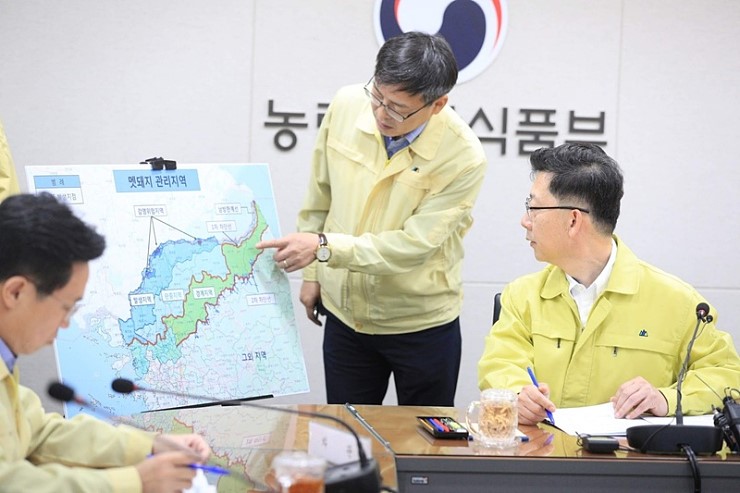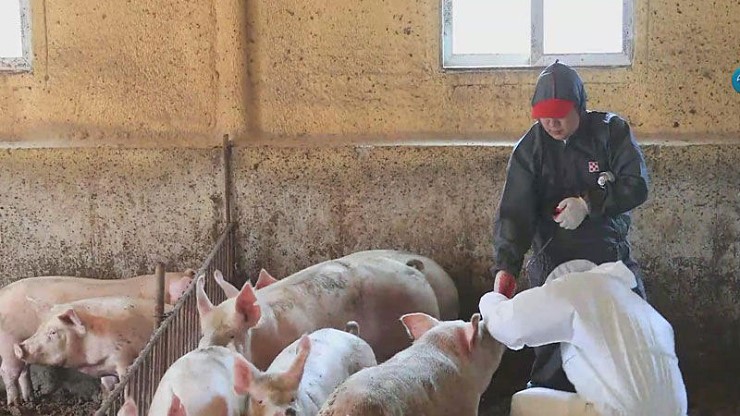The number of farms receiving a definite diagnosis of Africa Swine Fever recently increased to five in Ganghwa-gun, Incheon, rapidly increasing the number of pigs that had to be killed along with it. In response to the further spread of the disease, the government introduced special measures for pig farms in Ganghwa-gun and prohibited the movements of vehicles related to livestock raised in northern Gyeonggi Province from September 28.
Africa Swine Fever (ASF) is a viral hemorrhagic pig epidemic with high attack rates and percentages of infected animals. If pigs are infected with the highly pathogenic virus, the lethality is as high as 100 percent. For these reasons, ASF is also known as the ‘Black Death of pigs.’ Because it is a disease that developed mainly out of Africa, it earned the name ‘African’ Swine Fever. In Korea, ASF has been designated a type-1 disease under the Domestic Animal Infectious Disease Control Law. As adaptability to the environment is strong enough, ASF is highly contagious and resistant to acid and heat, so it can survive during cooking process and be contained in meat products.
Other animals, including humans, are not targets for ASF. Only those belonging to the Suidae, or pig family, can be infected. There are two main paths of infection. The first method is direct contact, which usually occurs when infected pigs come in direct contact with healthy pigs. The healthy pig is infected when it comes in contact with the saliva, respiratory secretions, urine or excrement of pigs that contain virus. The second method is indirect contact. This is when the virus is transmitted by non-living contact mediums, such as contaminated vehicles, feed and tools. The feed includes the remains, including tissues of infected animals that still contained the viruses. Pork distribution is currently banned in areas where ASF is suspected because food garbage generated while slaughtering infected pigs or distributing meat can cause healthy swine to be indirectly affected.
 |
| ▲ Kim Hyun-soo, minister of Agriculture, is looking at a map of wild pig management area at a meeting at Central Government Complex on October 13. (Photo from Hankyoreh) |
On September 27, new cases of ASF were diagnosed in Ganghwa-gun, Incheon. The Ministry of Agriculture, Food and Rural Affairs (MAFRA) stated that a farm in Hajeom-myeon, Ganghwa-gun tested positive for ASF. Then on October 6, two sows died after showing abnormal symptoms at a pig farm in Gwanin-myeon, Pocheon-si, which is the largest stockbreeding city in northern Gyeonggi province. After receiving the report, the MAFRA immediately sent in a quarantine team to implement emergency measures, including movement control and disinfection of people, livestock and vehicles, while requesting a thorough medical checkup of the dead pigs. Chungcheongnam-do province also took preventive measures after receiving the suspected report in Boryeong-si on the same day. The suspected cases in both Pocheon-si and Boreyong-si tested negative. Since September 17, ASF has been reported in 13 places, with Gyeonggi province and Incheon being the center of the outbreak. More than 140,000 pigs are on the list to be slaughtered due to the disease.
The Dankook Herald interviewed Kim Hyun-beom, a professor in the Dept. of Animal Resources Science at Dankook University (DKU), for more information about African swine fever. Currently, ASF is mainly occurring in northern regions such as Ganghwa Island and Paju. He said there are several ways to deal with contact infection, or canned pork food ingestion. However, the exact propagation path of South Korea's ASF has yet to be revealed. So, the government has a quarantine policy to prevent it from spreading further south. Therefore Seoul, Gyeonggi Province, and Incheon are designated as intensive management areas, and these areas ordered pigs to stop moving for 48 hours whenever ASF is confirmed. In addition, disinfection is carried out in each of the affected areas and more manpower is required. As ASF spread quickly in many countries, the government is strengthening quarantine inspection at airports and harbors. Food inspection is also mandatory when livestock is imported from the countries known to have reported cases of ASF. Furthermore, if pigs are killed because of ASF, the government will subsidize each farmer for the number of pigs they lost. They also offer financial support for quarantines and farm cleaning. Currently, Korea imports pork from many countries such as Spain and the U.S.A. However, the government does not import pork from countries known to be impacted by an outbreak of ASF. In addition, some people believe that eating pork can lead to an ASF infection. However, he explained that it is safe to eat pork, since ASF only affects animals and causes no harm to humans.
The outbreak of ASF has led to the slaughter of pigs, putting the pork industry on emergency alert. The Rural Development Association is conducting research and development in conjunction with the Animal and Plant Quarantine Agency to find key genes related to the infection of ASF virus and to learn more about the infection process. The government has decided to destroy pigs in areas with the ASF virus because no vaccine or treatment has been developed yet. This is because of the various genotypes of the ASF virus. The pig cannot defend itself from exposure to other genetic virus, even if it is vaccinated for one genotype of the ASF virus. To prevent further inflow of ASF, the government is strengthening countermeasures and establishing emergency plans that should help slow if not eradicate the further spreading of this lethal disease.
 |
| ▲ African swine fever occured at a pig farm in Paju for the first time in Korea on September 17. (Photo from SBS news) |
김민, 남윤경, 박근후 dankookherald@gmail.com

![[Campus Magnifier] Let's Surf the Library!](/news/photo/202404/12496_1765_4143.jpg) [Campus Magnifier] Let's Surf the Library!
[Campus Magnifier] Let's Surf the Library!
![[Campus Magnifier] Let's Surf the Library!](/news/thumbnail/202404/12496_1765_4143_v150.jpg)





